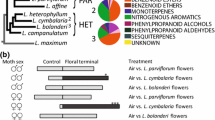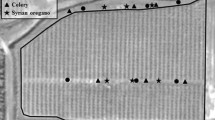Abstract
Polyploidization has played an essential role in the diversification of seed plants and often has profound effects on plant physiology and morphology. Yet, little is known about how plant polyploidization has shaped the ecology and evolution of interactions between phytophagous insects and their hosts. Polyploidization could either facilitate or impede colonization of new hosts. Greya politella (Lepidoptera: Prodoxidae) is highly specialized on plants in the genus Lithophragma (Saxifragaceae) throughout most of its geographic range. In central Idaho, some populations have shifted to the related Heuchera grossulariifolia, a plant that has repeatedly undergone autopolyploidization. Previous studies have shown that populations feeding natively on H. grossulariifolia prefer tetraploids to diploids in naturally mixed stands. We investigated whether this difference is caused by an inherent preference for tetraploids, or if the preference in present Heuchera-feeding populations has evolved over time. Moths from a strictly Lithophragma-feeding population were tested for preference of diploid or tetraploid H. grossulariifolia, using a combination of field experiments and caged choice trials. In all trials, attack rates on these non-hosts were very low, with no significant difference between ploidies. In addition, there was little evidence that females manipulated their clutch sizes when ovipositing into different plant species or ploidy levels. Hence, the local shift from Lithophragma to Heuchera in central Idaho is not due to failure of the moths to discriminate between these plant species. Furthermore, the higher attack rates on tetraploids in native H. grossulariifolia-feeding populations cannot be caused by a higher initial preference for these plants, but must instead be a result of differences in plant phenology and/or selection acting on local populations.
Similar content being viewed by others
Author information
Authors and Affiliations
Additional information
Electronic Publication
Rights and permissions
About this article
Cite this article
Janz, N., Thompson, J.N. Plant polyploidy and host expansion in an insect herbivore. Oecologia 130, 570–575 (2002). https://doi.org/10.1007/s00442-001-0832-1
Received:
Accepted:
Published:
Issue Date:
DOI: https://doi.org/10.1007/s00442-001-0832-1




